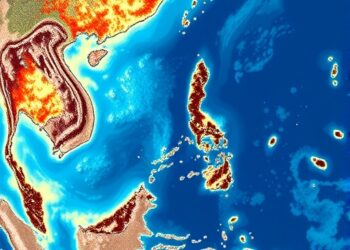North Sea oil and gas extraction can cause pollution to spike by more than 10,000% within half a kilometre around off-shore sites, a study has found for the first time.
North Sea oil and gas extraction can cause pollution to spike by more than 10,000% within half a kilometre around off-shore sites, a study has found for the first time.
The University of Essex, Natural History Museum and Centre for Environment, Fisheries and Aquaculture Science (CEFAS) research has uncovered the true impact on Britain’s seabed life – with the number of species plummeting nearly 30% near platforms.
The findings, published in Science of The Total Environment, come in the face of continued global fossil fuel exploration.
The study discovered pollutants like hydrocarbons were up to 10,613% higher within 500m of the platforms than unimpacted, further away sites.
And heavy metals – like lead, copper, and nickel – were 455% higher within the same distance.
Direct impact
Contaminants have been accumulating for decades around platforms and this study shows a direct impact on marine invertebrates – which play a key role in underwater ecosystems, acting as food for larger animals like fish.
The study examined data for 4,216 species collected from 1981-2012 at nine oil and gas platforms off the coast of Scotland and England and observed a general decrease in the number of species and individuals in the contaminated sediments.
Food webs – which describe the network of feeding interactions between species in an ecosystem – also became simpler and smaller from sediments within 500m of oil and gas platforms.
Large predators like starfish disappeared closer to the platforms with smaller organisms like worms able to thrive in the contaminated sediment.
Zelin Chen, a PhD student, led the examination of the data under the supervision of Dr Eoin O’Gorman and Dr Natalie Hicks, in the School of Life Sciences at the University of Essex, and Dr Murray Thompson and Dr Elena Couce at CEFAS.
Consistent trends
Mr Chen said: “We’ve known for a while that hydrocarbon extraction can impact biodiversity, but this is the first-time consistent trends have been found across several platforms.
“There were clear changes in community diversity and composition, with a general decrease in the number and type of species near the platforms after oil and gas production began.
“We were surprised at how simple the food web is close to the rig, with larger predators being more vulnerable to the changes than other species.”
Mr Chen used chemical data to define an impact zone within 500m of a platform, a buffer zone within 500-1500m, and unimpacted areas beyond that.
He then examined biological samples from each zone that were taken before and after production of oil and gas commenced at each platform between 1981-2012.
They showed the impact sites had a 28% decline in species richness, with fewer food web connections closer to platforms.
Concerning legacy
Dr Eoin O’Gorman, from the University of Essex, said: “This is important because simpler food webs with shorter food chains are highly indicative of less productive areas under environmental stress.”
Dr Natalie Hicks, also from Essex, added: “These platforms are leaving a potentially concerning legacy, particularly as many are reaching the end of life.
“Many of these sites will be decommissioned in the coming decade and we need to collaborate closely with industry and the Government to ensure decommissioning practice is led by science and done safely.
“The Ocean is one of our greatest natural resources, particularly for mitigating climate change, and we must all work together to safeguard its health for future generations.”
Dr Gareth Thomas, a Natural History Museum scientist who worked on the project, said: “Our collaborative study between the NHM, University of Essex, and CEFAS which spans 30 years of field data, demonstrates that oil and gas operations simplify complex ocean ecosystems, favouring small, hardy species and causing the disappearance of more delicate marine life.
“With more research, we hope to investigate the best way to deal with oil rigs after they shut down to find the best solution for our planet’s future.”
Journal
Science of The Total Environment
Method of Research
Meta-analysis
Subject of Research
Animals
Article Title
Oil and gas platforms degrade benthic invertebrate diversity and food web structure
Article Publication Date
15-Jun-2024




